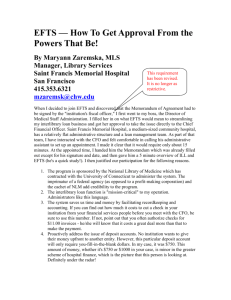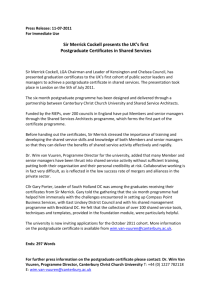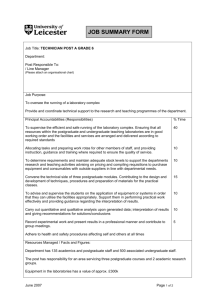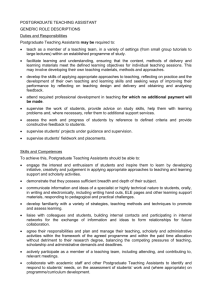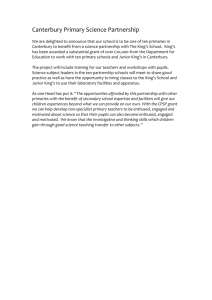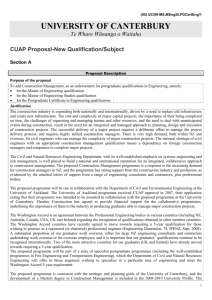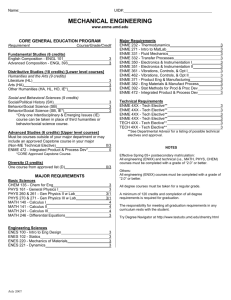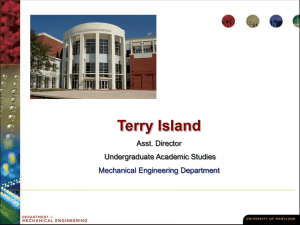Master of Engineering Studies
advertisement
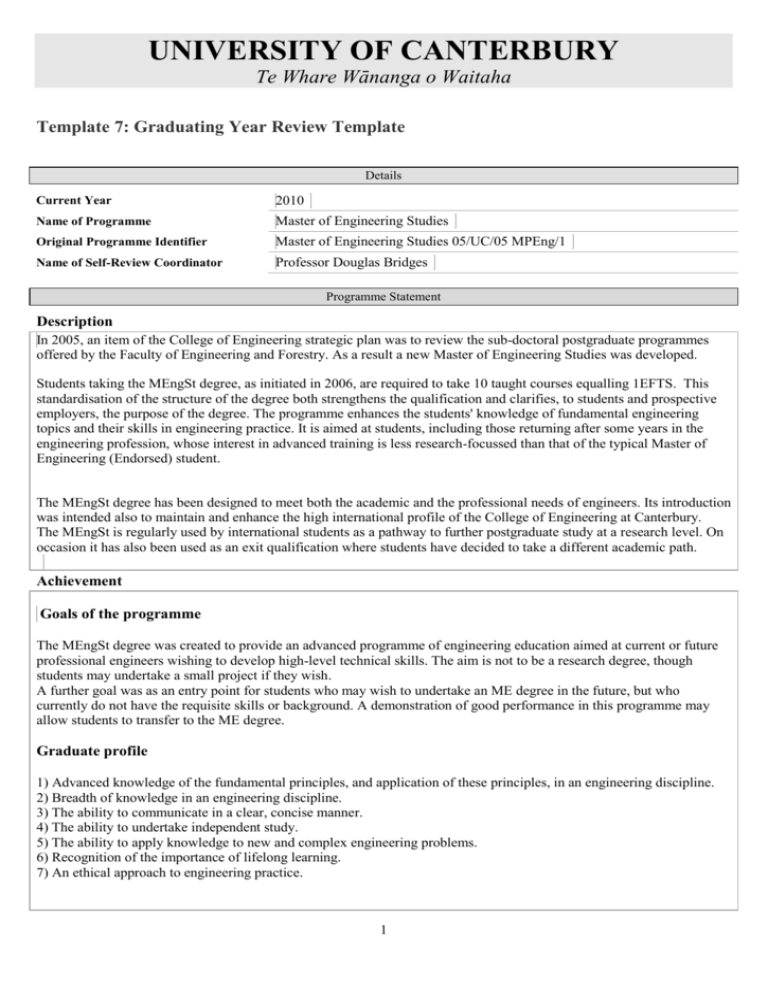
UNIVERSITY OF CANTERBURY Te Whare Wānanga o Waitaha Template 7: Graduating Year Review Template Details Current Year 2010 Name of Programme Master of Engineering Studies Original Programme Identifier Master of Engineering Studies 05/UC/05 MPEng/1 Name of Self-Review Coordinator Professor Douglas Bridges Programme Statement Description In 2005, an item of the College of Engineering strategic plan was to review the sub-doctoral postgraduate programmes offered by the Faculty of Engineering and Forestry. As a result a new Master of Engineering Studies was developed. Students taking the MEngSt degree, as initiated in 2006, are required to take 10 taught courses equalling 1EFTS. This standardisation of the structure of the degree both strengthens the qualification and clarifies, to students and prospective employers, the purpose of the degree. The programme enhances the students' knowledge of fundamental engineering topics and their skills in engineering practice. It is aimed at students, including those returning after some years in the engineering profession, whose interest in advanced training is less research-focussed than that of the typical Master of Engineering (Endorsed) student. The MEngSt degree has been designed to meet both the academic and the professional needs of engineers. Its introduction was intended also to maintain and enhance the high international profile of the College of Engineering at Canterbury. The MEngSt is regularly used by international students as a pathway to further postgraduate study at a research level. On occasion it has also been used as an exit qualification where students have decided to take a different academic path. Achievement Goals of the programme The MEngSt degree was created to provide an advanced programme of engineering education aimed at current or future professional engineers wishing to develop high-level technical skills. The aim is not to be a research degree, though students may undertake a small project if they wish. A further goal was as an entry point for students who may wish to undertake an ME degree in the future, but who currently do not have the requisite skills or background. A demonstration of good performance in this programme may allow students to transfer to the ME degree. Graduate profile 1) Advanced knowledge of the fundamental principles, and application of these principles, in an engineering discipline. 2) Breadth of knowledge in an engineering discipline. 3) The ability to communicate in a clear, concise manner. 4) The ability to undertake independent study. 5) The ability to apply knowledge to new and complex engineering problems. 6) Recognition of the importance of lifelong learning. 7) An ethical approach to engineering practice. 1 Appraisal The following summarises responses obtained from students and staff who were interviewed about the MEngst programme. The four students who responded to the questionnaire survey firmly agreed that the MEngSt's graduate profile truly reflected their learning outcomes for the degree and that it met their perceived needs. They appreciated the variety of courses available, the opportunity of taking advanced courses both within and outside their preferred speciality, and the projects that formed part of some of those courses. The main problems mentioned by the respondents were the high workload of 10 courses over two semesters (coupled with a perception that some academics assumed that the students were doing the ME degree and therefore had only a few courses per semester); a lack of courses in some specialisations; the attitude of some staff, who were negative about the MEngSt and told the students that they should be doing the more research-focussed ME; the timing of courses: working professionals had trouble getting to courses scheduled during the main part of the day; a lack of coordination over the timing of courses, even in one discipline (Civil Engineering was mentioned), causing students to miss one lecture in order to attend another; lecturers in different courses issuing large projects simultaneously, perhaps because (see above) they had in mind the ME students, who have at most four courses, and usually fewer than that, at any one time. The students were asked their preference between the current title of the degree and the originally planned one of "Master of Professional Engineering Studies". Three of the four respondents came down in favour of retaining the current title. Overall, the students viewed the MEngSt experience very favourably, and considered that it easily achieved the goals outlined in the graduate profile. One even mentioned that his future employer "believed that it was a well-structured degree programme ... and liked the variety of courses that [the student] was taking". A couple of respondents suggested that there might be some "more practical courses aimed at preparing students for a career outside academia". The staff, on the other hand, were very negative in their perception of the MEngSt. They felt that the degree was attracting weaker students than expected, especially from abroad. The high fees for overseas students were mentioned as a deterrent to better students, who could get a sound Master's education in the USA at a much lower cost. The staff felt that teaching small classes of weak postgraduate students was a frustrating and overly time-consuming task, and that it was imperative that more be done, by marketing and other means, to attract better students, especially foreign ones, to the programme. At the same time, it was recognised that the programme provided good value for those students who were prepared to work and had the right background on entry. Changes At the time of development of the MEngSt, it was believed that the entrance standard could be lower than that for the research-based ME (Master of Engineering - Endorsed) degree. Review of student progression rates indicated that students entering the MEngSt programme with a pass or third-class-honours BE degree did not do well in the coursework. In 2010 the entrance level for the MEngSt was changed to the same as that for the ME; the application for approval of this change is currently with CUAP. Students who wish to enrol in the ME but do not have a second-class honours BE or higher qualification still have a pathway into the MEngSt: they first enrol in the Postgraduate Certificate of Engineering, and if their performance therein is good enough, they will be able to transfer to the MEngSt. Initially it was also thought that students would take courses in a wide range of subjects. However, students have tended to stay within their main, preferred specialisations. Endorsements in the following areas were offered in the MEngSt for the first time in 2010: Civil Engineering, Construction Management, Mechanical Engineering. In 2009 a minor change to the regulations concerning which subjects were offered in the MEngSt caused confusion, to both students and staff, between subject areas and the endorsement. From 2010 the wording was changed to indicate that students could enrol in departments rather than subject areas. Review Processes E 2 Account of Review Processes This graduating year review is the first formal review of the Master of Engineering (Endorsed) at Canterbury. The panel for the review comprised Professor Douglas Bridges (Mathematics, Chair), Dr Philippa Martin (Electrical and Computer Engineering), and Professor Alan Nicholson (Civil Engineering), with Ms Lisa Carter as Secretary. Current and past students were randomly selected and then asked either to attend a meeting of the panel or, if that was not possible, to fill in a brief questionnaire. No MEngSt students attended the panel session, but four returned completed questionnaires. Six staff, from a range of engineering disciplines, attended the second session of the panel on the same day. The responses of students to the questionnaire, and the matters discussed by the staff before the panel, were used as the basis of the review. Initial consultation with the Dean of Auckland has begun; further consultation will resume after this document is complete. Review Outcomes E Acceptability The Master of Engineering Studies programme has the approval of CUAP. IPENZ was also consulted. A particular benefit of the degree is that the students experience lectures not only from resident experts at Canterbury but also from the international academics who visit Canterbury under its Erskine Fellowship scheme. The response of the students surveyed about the ME was very positive, but that of the staff was negative (see above). Graduates from the programme have typically gone on to positions in industry. Assessment procedures and student performance The assessment for the Master of Engineering Studies courses takes various forms: projects, tests, and examinations. Some of the courses consist of mini-research-projects, which are assessed by the lecturer on the basis of reports written by the student. Data Year Table 1: Numbers enrolling and completing Projected No. Actual No. Enrolled Enrolling Full-time Part-time EFTS No. Completed Withdrawals 2007 19 8 11 12.56 5 0 2008 13 7 6 8.40 4 0 2009 25 9 16 15.25 5 1 Notes Table 1. 1. 'Actual No. Enrolled' is the number of approved enrolments in the programme and includes withdrawals after the cut-off period for fees. 2. Full-time is 0.8 EFTS or greater in a calendar year. Part-time is less than 0.8 EFTS in a calendar year. Where courses are split over two years EFTS are divided by the number of months based on start and end dates 3. The number of EFTS is the total for all enrolments in the specified programme. 4. Completions are all those who have completed the academic requirements for the programme in the given year. 5. Withdrawals are students who have withdrawn from all courses in a programme. These students may or may not have returned in a subsequent year. Table 2: Distribution of grades (grade distribution per course is available upon request) Year 2007 Course Code A+ A A- B+ B B- COSC 2 1 1 1 ENCH 2 4 1 C+ C Fail 1 1 3 OTHER withdrawal ENCI 1 2 5 5 6 7 8 8 ENEL 4 1 5 1 2 3 5 7 ENFE 1 1 ENGR 2 ENME 2 1 1 1 1 2 2 1 1 ENMG 2 ENTR 1 MATH 1 MGMT 2008 1 COSC 1 ENCI 2 2 5 2 ENEL 5 3 3 9 1 3 3 7 1 ENFE ENME ENTR 2 GOEG 1 2 3 1 1 3 4 3 1 EMTH 1 ENCH 1 ENCI 7 7 8 5 2 6 6 8 ENEL 2 3 6 3 1 2 2 2 ENFE 1 ENGE 1 1 2 1 ENGR ENME 3 1 MGMT 2009 2 3 1 1 ENTR 1 2 4 9 1 2 2 1 9 7 4 1 1 3 Programme Evaluation Students see the MEngst as a good programme fulfilling their needs; however staff view it more negatively. Since the programme appears to meet the students’ expectations it is perhaps more successful than some staff realise. One of those staff concerns, the relatively low level of the students entering the programme, has been addressed by the raising of the entry level in 2010. This situation will be monitored over the next few years. The programme was also seen to be fulfilling another purpose in that approximately 25% of enrolled students use the qualification to bridge into the ME or exit with a Postgraduate Certificate. Recommendation 1: Faculty investigate the disparity between the students and staff regarding the value and attitude towards the programme. Continuation or Discontinuation 4 We recommend that the programme be continued, but that the College Postgraduate Committee meet to look urgently and carefully at the concerns of the staff who are teaching into the programme. 5

